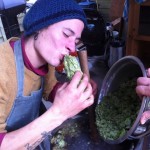Hop Experimentation – An Idea
Thursday, November 17th, 2011
How any IBU’s is too many?
Most craft beers now list the IBU (International Bittering Units) on the side of their bottles. I like hopped up beers – but, really couldn’t tell you my hop preference in an number form. You see, it all depends on the style of beer – some beers seemed too bitter at 60IBUs while Pliny the elder seems balanced at over 200IBUs… Then there is this monster: Alpha-Fornication (2500+)
So, I was thinking that it would be nice to have a horizontal comparison – the same beer, with the same ingredients – but at drastically different IBU levels.
For those playing at home, I guess you could try Dogfish Head’s 60, 90, 120 minute IPA line. Even then, the ABV would be different…
Overview:
Start with 10 gallons of 5% wort.
- Add hops every 30 minutes.
- Pull off 2 gallons
- Repeat until wort is gone.
Hypothesis:
This will give us a range of similar beers with exponentially varying levels of hop goodness.
Percieved Issues:
1. Evaporation will cause the wort to get stronger during the long boil.
True, but at least we can use a hydrometer to check this. And we can always dilute post boil to keep them all at 5%.
2. It’s going to be hard to calculate the true IBU’s & I don’t have the equipment to test for the real numbers
True, but I think we can make a fair estimation (see below).
3. It’s going to be hard to boil that last 2 gallons with 10oz of hops
True. That should be interesting.
Math
I put the numbers into a brew calculator. The Tinseth formula was used. For each one, I adjusted the grain level to meet 5% and then added the hops. The hops are Chinook @ 12.5%
| Gallons | Hop Additions | IBUs |
|---|---|---|
| 10 | 30 | 36 |
| 8 | 60, 30 | 100 |
| 6 | 90, 60, 30 | 212 |
| 4 | 120, 90, 60, 30 | 440 |
| 2 | 150, 120, 90, 60, 30 | 1123 |
Wait, that’s not right!
For one thing, that shows the numbers for adding all 10oz of hops to the 2 gallon boil. It does not take into account the acids that are pulled off when the other wort is removed!
| Gallons | Hop Additions | IBUs |
|---|---|---|
| 10 | 30 | 36 |
| 8 | 60, 30 | 93 = 100-(36/5) |
| 6 | 90, 60, 30 | 187 = 212-(100/4) |
| 4 | 120, 90, 60, 30 | 369 = 440-(212/3) |
| 2 | 150, 120, 90, 60, 30 | 903 = 1123-(440/2) |
This table isn’t perfect either, but accounts for *some* of the loss. In any case, it shows some huge hop potential!


